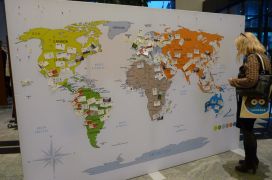The (food) world after corona

source: FoodPro Network International
AMSTERDAM - These are dynamic times. For everyone and everything, and certainly for our business environment: the international food world. The coronavirus is already having major consequences for foreign trade. Countries declare states of emergency or go into lockdown, air traffic is very limited. The big question is: What will the world look like after corona? Or will we be in the next pandemic?
We see a trend towards globalization, to ’every man for himself.’ The current examples of blockades at the German borders for medical equipment destined for Belgium, the futile call for European emergency aid by Italy illustrate this painfully. 'Corona brings out the worst in international politics,' observes Jonathan Holslag, professor of international politics at the Free University of Brussels. We tend to hide behind the 'apparent safe borders of one's own state', as Ian Goldin puts it in his recent article in de Volkskrant. However, the British economist is a strong supporter of globalisation. He argues that globalisation has made the world richer. And globalisation can also stop climate change. 'A green revolution demands investment, transfer of technologies, you need prosperity.'
If we look at the facts, we do indeed see that billions of people are lifted out of poverty, we live longer and healthier lives. Hans Rosling clearly indicates this in his book ‘Factfulness' by asking us all a few simple questions about the state of the world. Which we systematically answer incorrectly, because we have a wrong picture of the world. For example, we are still inclined to think in 'rich' (Western world) and 'poor' (the rest), whereas that is an image from 1960 and is now completely outdated. Rosling died of pancreatic cancer in 2017. I wonder how he, who has been active in Africa as a doctor to fight the Ebola virus, would look at the current virus outbreak for which he himself warns in his book.
Supporters of globalisation try to find the solution to global problems in finding a global answer. They hope that we will continue to see what we have in common internationally and that we will be dependent on each other. Harari, Israeli historian, futurologist and author of the books Sapiens, Homo deus and 21 lessons for the 21st century, gives a nice reflection on this in his article 'The world after coronavirus.' He clearly gives his view on the path we should go down. ‘Humanity needs to make a choice. Will we travel down the route of disunity, or will we adopt the path of global solidarity? If we choose disunity, this will not only prolong the crisis but will probably result in even worse catastrophes in the future. If we choose global solidarity, it will be a victory not only against the coronavirus, but against all future epidemics and crises that might assail humankind in the 21st century.'
In any case, this pandemic gives rise to a reorientation of our way of life and business. This applies to the global scale, national level, to our own organisations and to ourselves. We would like to think along with food entrepreneurs about new opportunities, both in a national and international perspective.
TEN the export network offers advice and support to food & beverage companies that dare to look across borders. We coordinate export activities, stimulate business development projects and set up new international routes. TEN professionalizes existing export activities and we are consultants working for the SIB program (Starters International Business Program of the RVO, Dutch Government) for SME companies. For more information: www.theexportnetwork.nl or contact us for an appointment: http://www.theexportnetwork.nl/contact/.
Written by: Janet Lebbink
Latest news
-
11 jan Nestlé Vietnam invests $100 million in coffee factory to meet growing consumer demand
-
11 jan TraceGains' Together Conference 2024
-
11 dec Alex Holt appointed Chief Sustainability Officer of Ahold Delhaize
-
29 nov Nestlé develops N3 milk with new nutritional benefits, launches first in China
-
21 nov Grocery shopping in Australia
-
20 nov Centuries-old-fermentation technique all hot again
-
12 sep The limits of exports
-
18 aug Detecting and Preventing Coffee Fraud
-
14 aug Connecting the world of food professionals
-
10 aug Sky-high expectations for vertical agriculture
Join the conversation
Are you already a member? Please
Login
Don't have an account yet? Please register